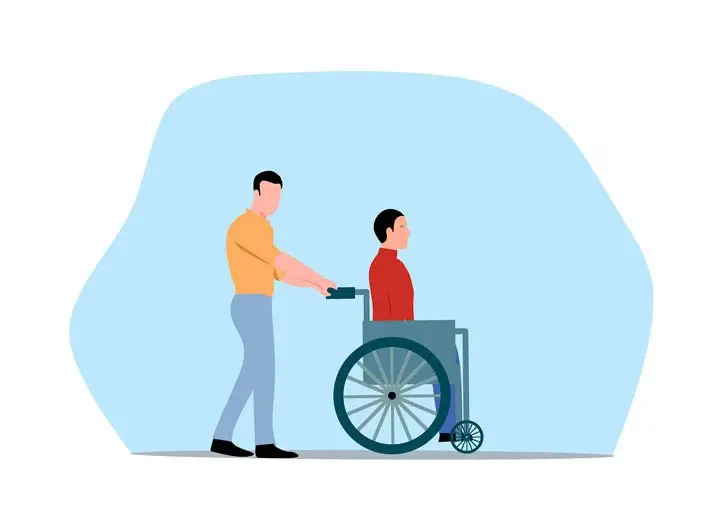Caring for a Loved One with Incontinence Caused by Alzheimer's

Alzheimer's disease is a progressive neurological disorder that affects millions of people worldwide. As the disease progresses, individuals may experience various forms of incontinence, particularly in the middle and late stages. The disease's impact on memory, thinking skills, and daily functioning can lead to difficulties with everyday activities, including managing incontinence.
Causes and Symptoms of Incontinence in Alzheimer's Patients
-
Memory Impairment: Forgetting recent conversations and events, difficulty remembering words, and impaired reasoning and judgment.
-
Environmental Obstacles: Difficulty recognizing the need to use the bathroom, medical conditions, and medication side effects.
-
UTI Risks: Catheters can increase the risk of urinary tract infections (UTIs), particularly when individuals pull the catheter.
Non-Invasive Solutions for Incontinence in Alzheimer's Patients
-
QuickChange Wrap: A non-invasive, discreet, and comfortable alternative for male patients to manage incontinence.
By understanding the causes and symptoms of incontinence in Alzheimer's patients, caregivers and healthcare professionals can better manage this challenging condition and provide effective solutions for improved quality of life.

The Stages of Alzheimer's Disease
There are three stages of Alzheimer's disease: mild, moderate, and severe. The mild stage is an early stage of the disease in which the individual can still function independently. Those in the moderate stage show significant memory loss, difficulty recognizing family and friends, confusion, and personality changes. The severe stage, the final stage of the disease, is when the person will require help with basic activities like eating and walking.
What symptoms may look like:
- Continuously misplacing possessions
- Repeating statements and questions
- Difficulty concentrating and thinking about abstract concepts
- Forgetting conversations, event, or appointments
- Forgetting the names of family members and everyday objects
- Getting lost in familiar places
- Inability to recognize numbers
- Being unable to take part in a conversation, express thoughts, or recall the correct word for objects
- Changes in personality and behavior
Dementia vs. Alzheimer's
Dementia and Alzheimer's disease are often used interchangeably, but they are not the same. Dementia is a group of symptoms that can be caused by several factors, while Alzheimer's disease is a specific type of dementia caused by the progressive damage and destruction of nerve cells in the brain.
Key Differences Between Dementia and Alzheimer's Disease
- Causes: Dementia can be caused by various factors, including depression, delirium, medication side effects, vitamin deficiencies, thyroid problems, and excessive alcohol use. Alzheimer's disease, on the other hand, is caused by the progressive damage and destruction of nerve cells in the brain.
- Symptoms: Dementia symptoms include difficulty with memory, problem-solving, language, and other cognitive skills. Alzheimer's disease symptoms include memory loss, apathy, depression, impaired communication, disorientation, confusion, poor judgment, difficulty speaking, behavioral changes, and eventually difficulty swallowing and walking.
Causes of Dementia-Like Symptoms
- Depression: Depression can cause symptoms similar to dementia, such as memory loss and difficulty concentrating.
- Delirium: Delirium is a condition characterized by confusion, disorientation, and altered mental status.
- Medication Side Effects: Certain medications can cause cognitive impairment and dementia-like symptoms.
- Vitamin Deficiencies: Vitamin deficiencies, such as B12 deficiency, can cause cognitive impairment and dementia-like symptoms.
- Thyroid Problems: Thyroid problems, such as hypothyroidism, can cause cognitive impairment and dementia-like symptoms.
- Excessive Use of Alcohol: Excessive use of alcohol can cause cognitive impairment and dementia-like symptoms.
Potential for Reversal in Some Cases of Dementia
- Depression: Depression can be treated and managed, and in some cases, symptoms can be reversed.
- Delirium: Delirium can be treated and managed, and in some cases, symptoms can be reversed.
- Medication Side Effects: Medication side effects can be managed and in some cases, symptoms can be reversed.
- Vitamin Deficiencies: Vitamin deficiencies can be treated and managed, and in some cases, symptoms can be reversed.
- Thyroid Problems: Thyroid problems can be treated and managed, and in some cases, symptoms can be reversed.
By understanding the differences between dementia and Alzheimer's disease, as well as the various causes of dementia-like symptoms, individuals can better manage their condition and improve their quality of life.
Causes of Alzheimer's Incontinence
When your loved one begins to deal with incontinence, it's essential to discuss with your doctor as it may not have to do with their ability to recognize that they need to use the restroom. Possible causes include:
Medical conditions such as UTIs, constipation, and prostate problems. Incontinence can also be a result of diabetes, a stroke, or a muscular disorder.
Medication such as for sleeping or to reduce anxiety may relax the bladder muscles, which can lead to urinary incontinence.

Managing Incontinence
When caring for an Alzheimer's patient with incontinence, there are steps that caregivers can take to aid the situation.
First, it's important to understand that accidents can be embarrassing for the person, so it's best to approach the situation in ways that preserve dignity. Be matter-of-fact, don't scold. That being said, communication is vital, both in encouraging the person to communicate with you if they need to use the bathroom and in letting them know that it's safe to talk to you.
Make finding the bathroom easy for them by keeping the bathroom door open, so the toilet is visible. Remove any items that could be mistaken for a toilet, such as trashcans and plant pots.
As the caregiver, pay attention to that person's bathroom routine and schedule so that you may be able to remind them to go to the restroom. Be sure to choose clothing that is easy to remove and clean, as accidents can happen at any time.
When leaving the house, make a note of where bathrooms will be at your destination, and when there, let the patient know where the restrooms are. When going out, padded undergarments and adult briefs can be used, even if the person doesn't ordinarily use them—this can be of help when going somewhere where getting to the toilet might be difficult. In these situations, if the man is bowel and urine incontinent, a QuickChange can be used in conjunction with briefs— this way, if only the wrap is soiled, you won't need to change the briefs as well.
The Later Stages of Alzheimer's
As Alzheimer's disease reaches the last stages, the brain changes affect physical functions. Someone impacted by the disease may have difficulty swallowing, balancing, and bowel and bladder control. These symptoms can, in turn, increase the patient's vulnerability to:
- Falls
- Bedsores
- Dental problems
- Malnutrition and dehydration
- Fractures
- Infection
Treatment
While medication can for a time improve or slow the progression of symptoms, however, no treatment cures Alzheimer's disease. Your doctor may prescribe drugs to slow down the progression of the disease. However, it's important to understand available options to treat some symptoms to improve quality of life.
People affected by this disease often have a difficult time sleeping. While medication may be prescribed, there are also non-drug approaches that doctors recommend trying first. Sleep problems can be made worse by depression, restless leg syndrome, and sleep apnea.
To help promote rest:
- Avoid alcohol, caffeine, and nicotine
- Treat pain
- Maintain regular meal and bedtimes, as well wakeup time
- Regular exposure to the sun
- Nightlights and security objects
Changes in behavior begin to happen as the brain cells deteriorate. This can often look like irritability, aggression, emotional distress, anxiety, delusions, hallucinations, and depression. Change can be stressful for anyone, but it can be particularly difficult for someone affected by Alzheimer's disease.
Situations that may trigger distress:
- Moving locations
- Changes in familiar environment or caregivers
- Hospital admission
For the caregiver, it is essential to identify what may trigger the person's response. It's also vital for the caregiver to recognize that the person isn't intentionally mean but that it is a symptom of the disease.
Some ways to manage these symptoms include:
- Avoid being confrontational
- Respond to emotion and not behavior
- Check for pain, hunger, thirst, constipation, full bladder, fatigue, infections, and skin irritation
- Create a calm environment
- Plan for periods of rest between stimulating events
- Acknowledge their requests and questions
When non-drug approaches fail, medication will be needed to help with sleep and behavior.
Caregiving
There can be many challenges when caring for someone with Alzheimer's disease, and the care tends to be long-term. According to the CDC, 32% of caregivers working with a patient with dementia end up providing care for five or more years.
Planning activities is an excellent way for caregivers to keep their loved ones or patient engaged. Activities are best planned at the time of the day when the person with Alzheimer's is at their best. Some great activities to plan for:
- Going for walks and light stretching
- Listening to music
- Cooking and baking
- Household chores
- Visiting friends and family
- Seeing a movie
When going out, some caregivers will carry cards that they'll hand out that say things like, "My partner has Alzheimer's disease and may say or do unexpected things. Thank you for understanding."
A nutritious diet is important for everyone, but particularly when someone has this disease. People with Alzheimer's may forget when they last ate, eat the same foods every day, or forget how to cook. As a caregiver, you can ensure that the person is getting enough nutritious food by giving them finger foods that are easy to pick up and eat, easy to chew, and serving meals at the same time every day.
Anxiety can become high for a person with Alzheimer's, so helping boost their self-esteem can be helpful. It's essential to ensure that everyday hygienic tasks are done, like brushing teeth, showering, and trimming nails. Other important routines include getting them dressed by helping choose and layout outfits, also opting for clothing with velcro or zippers.
Some of the products that can help when caring for someone with Alzheimer's disease:
- Timed pillboxes
- Picture phones
- Medical alert bracelets
- Nightlights
- Object locators
- Weighted blanket
- QuickChange Wrap (for men with urine incontinence)
Care for the caregiver
The challenges of this disease also make self-care particularly important for the caregiver. Caring for a family member with Alzheimer's disease can affect the caregiver's physical and mental well-being. You can't pour from an empty cup, which is why self-care is so important. So, what can you do?
Some ways to take care of yourself as a caregiver include:
- Talking about your loved one's condition with close friends and family. You also have the option of speaking with a counselor or support group. Speaking about what you're dealing with help to relieve emotional tension
- Sleep 7-9 hours every night
- Daily exercise can relieve stress and increase energy levels
- Eat healthy foods
- Take breaks every day
- Make time to see friends
Don't be afraid to ask for help. Caring for someone with Alzheimer's isn't easy, and you don't have to do everything yourself. You can ask for help by asking people that you're close with to make meals, visit, or take care of the person for a short time. There are also home healthcare services that you can reach out to, and there are national resources that help pay for some of this help.
——
Sources
-Mayo Clinic
https://www.mayoclinic.org/diseases-conditions/alzheimers-disease/symptoms-causes/syc-20350447
-National Institute of Aging
https://www.nia.nih.gov/health/what-alzheimers-disease
-Alzheimer's Association
https://www.alz.org/alzheimers-dementia/treatments/for-sleep-changes
-Medical News Today
https://www.medicalnewstoday.com/articles/326374#communication
-Alzheimer's Association: 2018 Alzheimer's Disease Facts and Figures


